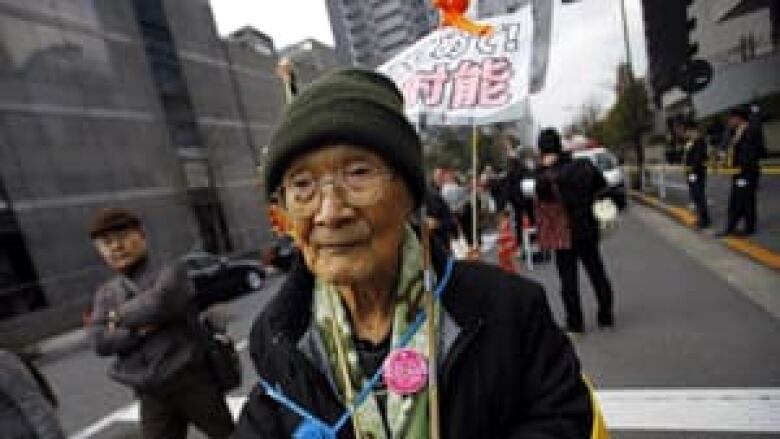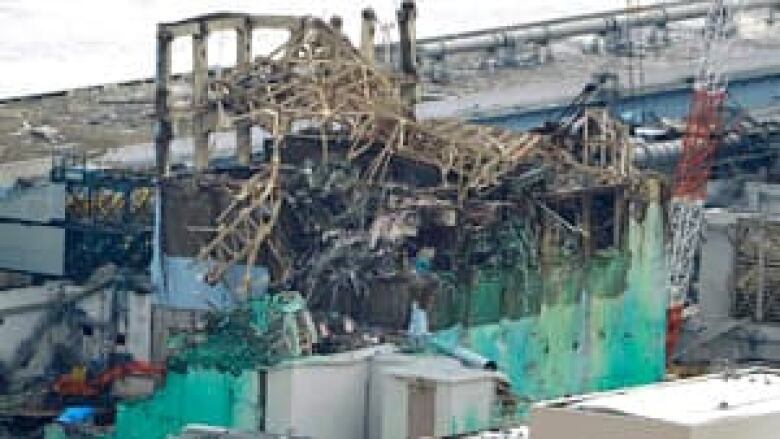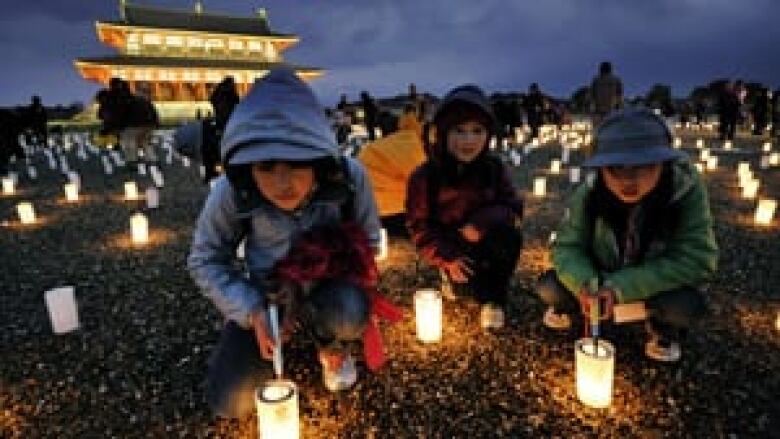Prayers, protests mark Japan tsunami anniversary
The people of Japan paused for a moment of silence to mark the one-year anniversary of a powerful earthquake and subsequent tsunami that killed almost 19,000 people and left hundreds of thousands of others homeless.
Entire cities and towns were wiped off the land by the twin disasters, and more than 340,000people who lost homes are still living in temporary housing a year later.
Emperor Akihito led a national memorial service in Tokyo, andsmaller memorials were held across the country.
The moment of silence was observed at 2:46 p.m. local time Sunday, at the exact moment the 9.0-magnitude earthquake hit last year and unleashed a wall of water that hit Japan's northeast coast.
While much of the debris has been gathered into massive piles, very little rebuilding has begun.

"I wish I could go back to my old house and get back our normal life again," said Hyakuaiko Konno, a 64-year-old woman from the Ishinomaki coast who has been living in temporary housing for the past seven months.
The government says the damaged Fukushima Dai-ichi nuclear plant, where three reactor cores melted down after the tsunami knocked out their vital cooling systems, is stable and that radiation coming from the plant has subsided significantly.
However, the plant's chief told journalists visiting the complex recently that it remains in a fragile state, and makeshift equipment some mended with tape could be seen keeping crucial systems running.
At the memorial in Tokyo, the Emperor thanked those who fought to bring the damaged reactors under control in the immediate aftermath of the quake and tsunami.
Toronto memorial
A solemn crowd gathered in Toronto to honour the thousands killed or displaced by last year's devastating earthquake in Japan.
Many teared up during the afternoon ceremony at the Japanese Canadian Cultural Centre.
All bowed their heads in silence at precisely 2:46 p.m.the time the quake hit on March 11, 2011.
"I would like to take this opportunity to deeply thank the people who helped the victims and those in the disaster zones, and those who helped deal with the nuclear crisis," he said, with the Empress Michiko at his side.
Anti-nuclear protesters at a downtown Tokyo park also held a moment of silencebefore marching toward the headquarters of Tokyo Electric Power Co., the operator of the Fukushimaplant. Public opposition to nuclearpower has grown in the wake of the nuclear disaster, the worst since Chernobyl in 1986.

CBC News reporter Craig Dale in Tokyo said people plan to continue to gather at the park to pressure the government to shift away from nuclear power and to "more renewable forms of energy and more fossil fuels."
Dale said he saw one placard that read: "40 years of brainwashed ultra-expensive stupidity."
Officialsimposed a 20-kilometre no-go zone around the plant and tens of thousands of neighbouring people who lived in the area may never be allowed back.
Only two of Japan's 54 reactors are now running while those shut down for regular inspections undergo special tests to check their ability to withstand similar disasters. They could all go offline by the end of April if none are restarted before then.
PM acknowledges government'sfailures
The Japanese government has pledged to reduce reliance on nuclear power, which supplied about 30 per cent of the nation's energy needs before the disaster, but says it needs to restart some nuclear plants to meet Japan's energy needs during the transition period.
Prime Minister Yoshihiko Noda has acknowledged failures in the government's response to the disaster, being too slow in relaying key information and believing too much in "a myth of safety" about nuclear power.

In a statement from Vienna marking the anniversary, the International Atomic Energy Agency called the Fukushima accident "a jolt to the nuclear industry, regulators and governments."
Although it was triggered by a natural disaster, the accident highlighted "existing weaknesses" in regulatory oversight, accident management and defence against natural hazards, the IAEA said.
In a statement Saturday, Prime Minister Stephen Harper said Canada honours the memory of the thousands who perished on the day a year ago and is inspired by Japan's determination to rebuild in the wakeof such a tragedy.
"On this solemn day, I would also like to convey how much Canadians admire the amazing resilience of the Japanese people in the face of such devastation," the prime minister said."Our country continues to be inspired by how the people of Japan with calm, ingenuity and practicality are translating iron resolve into reconstruction and recovery."
With files from The Associated Press and The Canadian Press












_(720p).jpg)


 OFFICIAL HD MUSIC VIDEO.jpg)
.jpg)



























































































